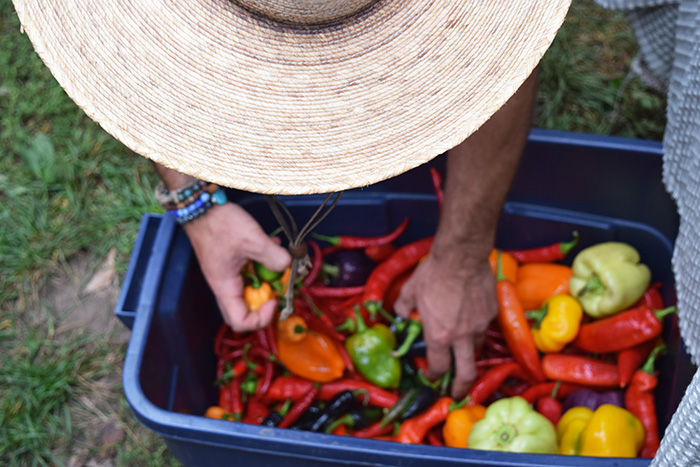It is 9 a.m. on Thursday, Sept. 15, and the walkway at the Roddick Gates is crammed with fresh fruit and vegetables. Monica Allaby, U3 Geography, is busy stacking boxes of squash, tomatoes, kale, eggplant, and other seasonal produce. Allaby isn’t worried about the early hour, however, because she loves working at McGill’s Farmer’s Market as a coordinator.
"I really fell in love with it as a place—a place for people to meet and discuss food,” Allaby said.
The farmer’s market team—accompanied by approximately a dozen other vendors—line McGill’s Y-intersection, illuminating the usually mundane path with the abundance of fresh produce. For the volunteers at the market, selling food is a way to mingle with community members and build important connections in the network of local food advocates.
The farmer’s market is a student-founded and student-run effort that began in 2008. Every Thursday between Sept. 8 and Oct. 27, from 12 to 5 p.m., the market brings fresh, organic fruits and vegetables, homemade preservatives, fair trade coffees and teas, honeys, maple syrups, and some of the best baked goods in the city to campus.
[metaslider id=46220]
Allaby became a part of the market team two years ago, joining other coordinators who are all passionate about making local food more accessible.
One integral member of this team is Amelia Peres, U4 Geography. Peres believes that farmer’s markets like McGill’s are a good first step toward making sustainable community-based food affordable for everyone, not just those in high-income brackets.
“My ideal future for the food industry would be a system that would be able to marry sustainably community-based food with food that is affordable and productive for a community, and not just relegated to the upper echelons of society,” Peres said.
The market works to make that dream a reality through their affordable weekly produce Community Supported Agriculture (CSA) baskets. CSA is a food partnership created to support local farmers and to provide seasonal, organic, and local produce to the McGill student body in weekly produce baskets. Over the course of eight weeks, the CSA provides baskets of three different sizes sourced from three local farms in the greater Montreal area: Les Jardins Carya, MacDonald Student-run Ecological Gardens (MSEG), and Les Jardins de la Résistance. These baskets, which cost between $15 and $30 per week, give students the chance to eat organic and ecologically friendly food, fairly inexpensively.
However, for the market organizers, it isn’t just about providing sustainable produce; it’s about sharing that produce and cultivating a sense of community.
"I realized all the different facets that food has,” Peres said. “How many different ways it manifests and how many different ways it matters to people—in terms of either community, or sustainability, or social justice, all those different things.”
Erlend Bjorklund, U4 International Development Studies student and manager at MSEG—which is the MacDonald campus garden—echoed Peres’ sentiments. After a year-long, full-time apprenticeship with MSEG, growing and selling local produce across the city, Bjorklund believes that initiatives like the student market are a great first step in the process of reuniting people with their food.
"I think [buying local produce] is important to everybody. The whole notion of a food system is that with modernity, we have become more and more disassociated with that,” Bjorklund said. “We don’t know where our produce comes from, we have no relationship to the people who grow it, and we also don’t pay the people who grow it very well [….Buying locally] is way more intimate because you get to see the people who made this happen.”
Despite all of its clear benefits, running the student market and other local food initiatives does not come without challenges. Establishing a consumer network is difficult for small farms like MSEG when the agriculture industry is dominated by large companies.
"With mega-producing agricultural systems—formally known as mono-cropping—massive corporations have virtually monopolized the industry,” Bjorklund explained. “This makes affordable and accessible local planting, growing, and selling extremely difficult to sustain.”
Despite the unfortunate reality of mega-agribusiness, many grassroots initiatives are working to bring attention back to local farming. International movements such as Seed Sovereignty, and community-run initiatives like McGill’s MSEG and Organic Campus are helping local communities reclaim their food.
For Bjorklund, efforts such as MSEG are both more ethical and more community-oriented. Having access to food that is grown in an ecologically sound way, and charged for a fair price, is a privilege. Because many members of McGill’s student body have been given this privilege, Bjorklund notes that they have an even greater role to play.
“Food used to be seen as a bare necessity,” Bjorklund said. “Yes, it is a bare necessity, but it is something that we should treat with respect. It’s a privilege, not a right. We do have a right to food, but we also are privileged to have good food [….] Being a very largely privileged student body, we have this small responsibility to support our local food systems.”
Small efforts like the farmers market contribute to an even larger fight against the corporate aspect of food systems. Where large agricultural corporations may have 100 acres of one crop, MSEG has over 60 crops stretched across two and a half acres of land.
By Thursday afternoon, the McGill Farmer’s Market is crowded with students buying locally-grown produce. The market as a whole has sold a plethora of goods and distributed over 120 food baskets.
For Bjorkland, initiatives like the McGill Farmer’s Market and MSEG help to both diversify the farming industry and put farming back into the community’s backyard.
"With the right policies to help this small movement, we can level the playing field so that those big corporations aren’t so dominating and oppressive and depressive,” Bjorklund said. “You can’t colour your food with monoculture, but you can with diversity.”
To read more about the McGill Farmer’s Market, visit their website. To learn more about MacDonald Student-run Ecological Gardens, visit their website.








